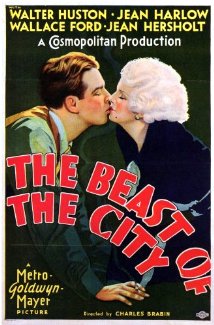
THE BEAST OF THE CITY
US, 1932, 86 minutes, Black and white.
Walter Huston, Jean Harlow, Wallace Ford, Jean Hersholt, Nat Pendleton, Mickey Rooney.
Directed by Charles Brabin.
The Beast of the title is the criminal element, embodied in criminals who feel they dominate a town – with memories of Al Capone and others.
This is a gangster and police film, in look and style and theme like something from Warner Brothers at this period. However, it is from MGM with MGM production values.
The film begins with a message from President Herbert Hoover, urging films not to glorify criminals but to glorify the hard work of the police. The central character is Jim Fitzpatrick, played by Walter Huston, a year before his Gabriel over the White House, another very political film of the period. He is hard, relentless, willing to beat confessions out of the accused but thwarted by lawyers and the criminals getting out on bail. On the other hand, he is presented at home as a genial father and husband – with Mickey Rooney appearing as his young son. His brother, also Detective, Ed, played by Wallace Ford, lives at home.
Fitzpatrick is demoted to a desk job but, after a bank robbery and his saving of a wounded man, he is in the headlines and it is decided to make him chief of police. He takes a hard but just line, singling out a squad to bring down the main criminal, played by the humanitarian Jean Hersholt. Jean Harlow, in an early role, is a gangsters moll. But, Ed is attracted to her and eventually persuaded by her to get some money by crooked means, allowing himself to be knocked out, thieves stealing a truck with money in it, but chased by police who have been set up by Jim as backup and there is a chase, shootout, the death of one of the policeman (always worried by the media getting his name wrong or omitting it), and the death of a child.
The gangsters intimidate the jurors with thugs present at the trial, with the verdict of not guilty, and the disgusted comment by the judge.
Ed is ashamed of what he has done, approaches his brother, offers to confront the gangster, with the police following through – and an enormous shootout.
A morale booster but rather grim in its presentation of the dominance of gangsters as well as the difficulties in police work.
Some of the photography is very skilful – for instance, some Robert Alteman-like sequences in the police corridor where the camera moves from one group to another and back. The director is an Englishman, Charles Brabin.
1. A film of 1932, of the Depression, of the Prohibition, of speakeasies, of gangsters, of the role of the police?
2. Black-and-white photography, an MGM film in the Warner Brothers vein? Musical score?
3. The prologue, the comment on the proliferation of the gangster films, the allegation that gangsters were glorified, the need for glorifying police and their police work, to eliminate the criminals? The quote from President Herbert Hoover?
4. The picture of the police, Jim Fitzpatrick and his work, relentless, raids, arrests, the criminals taken in, their lawyers, arguing for bail, the lack of hard evidence, having to let the criminals go? Fitzpatrick, his loyal friends, the support of his brother? The police chief, the Mayor and elections?
5. The character of Jim, strong, family man, loving his wife, with the twins, with the boy, with his brother at home, the comedy with the pancakes? His humane face at home? The letter arriving, his being transferred to a desk? The reaction of his wife, her support, having to move?
6. His work, at the desk, the small cases, the visit of his friends, the news of the bank robbery, the chase, the wreckage along the way, the pursuit of the criminals, shooting one, the rescue of the wounded policeman? Headlines?
7. His being promoted, his oath, his awkward speech, not used to broadcasting?
8. The meeting with the men, the big squad, his firm principles? His setting up a squad to get Sam Bellmonte? His relationship with his brother, the strong bond, his brother wanting a promotion, Jim telling him he had to earn it?
9. Ed, at home, unmarried, the encounter with Daisy, interrogation, drinking, falling in love, the outings? Her background, prison, in the lineup, her interview with the police? Stenographer, on the payroll of Belmonte? Leading Ed on? Wanting to go to Paris, urging him to go? The need for money? Tempting him with the job, the authorities having confidence in him, supervising the transfer? The setup, the two men, knocking him out, taking the truck? Jim having put to police on the tail? The chase, the shooting of the child? The policeman shot? The arrests?
10. Their being brought in, Jim and his disgust?
11. In court, Ed saying he couldn’t remember? The lawyer on the payroll, his melodramatics in the interrogation, his plea to the jury, the thug sitting in the hall and menacing the jury? Their verdict of not guilty? The judge and his disappointment and reprimand?
12. Jim, his regrets? Ed coming to see him, Ed’s change of heart? The idea, his going to the club, the confrontation with Belmonte? The police with him, the volunteers, the guns, the risks in the shootout?
13. Ed going to Belmonte, the confrontation, Jim’s arrival? Getting the guests out of the club? Ed taken hostage, being shot by Belmonte? Gunfight breaking out, Daisy being shot? The deaths on both sides in such a shootout?
14. An unexpected ending, the heroics, on the side of the law, to get rid of the criminals, to not have them dominating town? Morale boosting at the beginning of the 1930s?